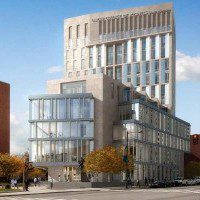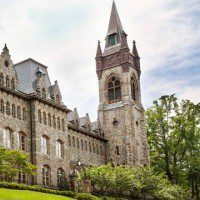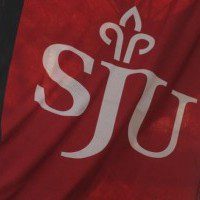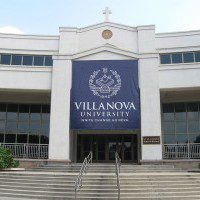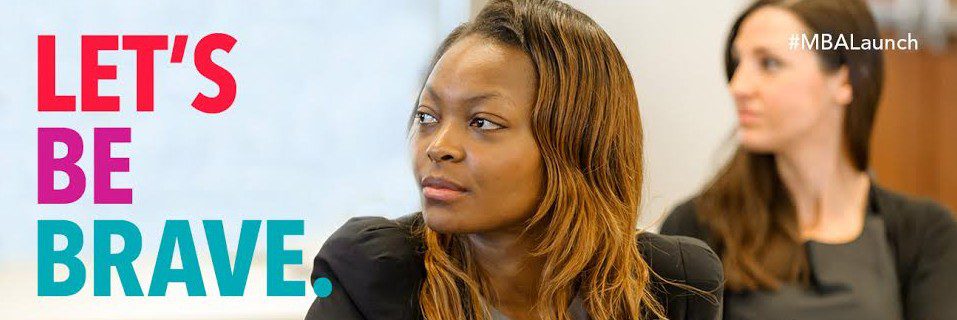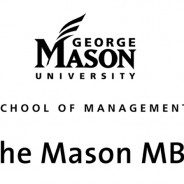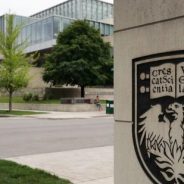If you are thinking about taking the GMAT or want to learn more about Veritas Prep’s GMAT courses, register to attend a one-hour seminar hosted by Veritas Prep’s course co-creator. This seminar will show you what to expect from the GMAT and how to conquer the exam.
Search results for where should I work:
Evening MBA
Santa Clara University Evening MBA Program Structure
The Santa Clara University Evening MBA at Leavey School of Business classes typically meet just two days a week—on Mondays and Wednesdays or Tuesdays and Thursdays—lasting two years.
Integrated courses cover the business fundamentals in a cohort format. The lock-step interdisciplinary nature of the program allows for an optimal learning environment that facilitates effective discussions and group projects. There are two intakes of students each year, with classes beginning in the fall or spring.
Santa Clara University Evening MBA Curriculum
The Santa Clara University Evening MBA program requires completion of 70 semester units of coursework comprising 14 foundation courses, one required elective and 26 units of electives.
Students pursuing a specific concentration should dedicate at least twelve units, and the remaining eight elective units are un-allocated and may be taken in any discipline. Core courses include: Effective Business Communications; Financial Accounting; Analysis, Design, and Management of Enterprise Platforms; Managerial Economics; Business Analytics; Business Ethics; Doing Business in Silicon Valley; Financial Management; Analytical Decision Making; Leading People and Organizations; Marketing is Everything; Operations Management; Quantitative Methods; and Strategy.
Students can choose elective from six different concentrations: Data Science and Business Analytics, Entrepreneurship and New Venture Creation, Finance, Leading Innovative Organizations, Food Entrepreneurship, and Marketing.
International study is an optional opportunity to integrate with the curriculum. Faculty and students visit corporate headquarters and government agencies of the selected region to understand the global nature of business first-hand. Previous classes have visited Korea, Switzerland, and Chile.
Part-Time MBA Rankings
U.S. News & World Report: #20 Part-Time MBA
Fortune Magazine: #16 Part-Time MBA
Class Profile
The most recent class of Santa Clara University Evening MBA students entered the program with around eight years of professional work experience, a 3.4 GPA, average GMAT of 626 and were around 31-years old. Forty-two percent of the most recent class was female.
Tuition, Scholarships, and Financial Aid
Tuition for the Santa Clara University Evening MBA cost $1,198 per unit, with students completing a minimum of 70 units for the program.
Most student loans are based on either financial need or creditworthiness and are available only to US citizens and permanent residents. Students commonly use the Federal Stafford Loan Program and Alternative Education Loans. Private loans may also be available.
Applicants are automatically considered for merit-based scholarships during the admissions process. Scholarship recipients are awarded at the time of admission. Scholarships are awarded each term (except summer), through graduation, conditioned upon cumulative 3.0 GPA throughout the program. Scholarships are awarded each term (except summer), through graduation, conditioned upon cumulative 3.0 GPA throughout the Santa Clara University Evening MBA program.
Santa Clara University Evening MBA Admissions
Applicants to the MBA programs must have completed a Baccalaureate degree or recognized qualifications equivalent to a degree.
To apply to the Santa Clara University Evening MBA program, applicants must submit a completed application form, official copies of transcripts from each institution attended, current résumé, and two letters of recommendation. Official GMAT score OR GRE scores must also be sent in by applicants, along with a $148 application fee. However, a GMAT/GRE waiver is also available. International students from non-native English-speaking countries must provide a recent TOEFL score in order to prove English fluency.
Once the application is submitted, students will be contacted to schedule a mandatory evaluative interview.
Deadlines:
Fall 2022 Enrollment:
Round |
Application Deadline |
Interviews* |
Notification |
Enrollment Fee Due |
|---|---|---|---|---|
1 |
||||
2 |
||||
3 |
||||
4 |
STATS
| Cost : $1,198 / Unit for 70 units
Length of Program : 2 Years |
| Female Student Body : 42% |
| Average GMAT Score : 626 |
| Work Experience Average : 8
Graduate Program Offerings : Leavey offers a wide range of programs including MS options in Business Analytics, Finance Analytics, Information Systems, and Marketing. Students may also achieve their MBA in part-time, full-time online or executive formats. |
Harvard Professor Suggests Super Bowl Ads for Multitaskers
In the age of portable technology, TV viewers often surf the web on a cell phone or laptop while simultaneously watching TV. In 2012, a Nielsen survey revealed that roughly 40 percent of tablet and smartphone users use their devices while watching tv on a daily basis.
Two years ago, 60 percent of football fans reported that they planned to use a smartphone, tablet, or laptop while watching the Super Bowl. 13 percent of respondents said that they would do so during the game, while the rest planned to use other forms of technology during commercial breaks. This survey is particularly worrying for advertisers, who paid an average of $4 million dollars per 30 second Super Bowl ad during the 2013 game.
“Advertisers are paying based on the audience watching a program,” says Thales S. Teixeira, a professor of marketing at Harvard Business School. “If people stop paying attention en masse, they are not getting everyone they are paying for.”
However, Teixeira says that advertisers should see the multitasking trend as an opportunity as well as a challenge. If viewers have their laptop or cellphone nearby, a tv ad could lead them to make a quick online purchase while watching the game. Teixeira and co-authors Jura Liaukonyte of Cornell University and Kenneth C. Wilbur of the University of California, San Diego have written a working paper called “How TV Ads Trigger Online Shopping” about how advertisers can use viewer multitasking to their advantage. The paper considers when viewers are likely to purchase something they saw on television, but also what types of ads encourage them to purchase products and services online.
The researchers used two databases to study viewer behavior. One database from Kantar collects data from television monitoring boxes to analyze what volunteers watch while at home, including commercials. Another from comScore analyzes what users do online, including how long they stay on certain websites and what they purchase from e-commerce sites. The databases allowed researchers to analyze how particular ads affected the number of visits to the advertisers’ websites, and the number of purchases that people made on the websites.
The researchers divided the ads into four main types. Action-focused ads, which encourage viewers to take action by offering sales, special deals, and incentives to shop, increased visits to advertiser’s websites, but did not increase the number of purchases per visitor. Product- and emotion- focused ads, which give people reasons to buy a particular product or encourage people to form attachments to a brand, increased the number of purchases made by people who were already visiting the advertiser’s site.
Intriguingly, the study found that imagery-focused ads, the sweeping works of advertising that are mainstays of the Super Bowl, actually reduce sales. Big showstopper commercials lead to fewer website visitors and fewer sales for the advertiser, potentially because people are so enthralled by the ad that they don’t switch to using other forms of technology.
The Super Bowl has always been a competition between advertisers as well as a competition between football teams. Texeira’s paper can show retailers how to remain competitive by adapting to new technology and viewer habits.
Harvard Professor Suggests Super Bowl Ads for Multitaskers
In the age of portable technology, TV viewers often surf the web on a cell phone or laptop while simultaneously watching TV. In 2012, a Nielsen survey revealed that roughly 40 percent of tablet and smartphone users use their devices while watching TV on a daily basis.
Two years ago, 60 percent of football fans reported that they planned to use a smartphone, tablet, or laptop while watching the Super Bowl. 13 percent of respondents said that they would do so during the game, while the rest planned to use other forms of technology during commercial breaks. This survey is particularly worrying for advertisers, who paid an average of $4 million dollars per 30 second Super Bowl ad during the 2013 game.
“Advertisers are paying based on the audience watching a program,” says Thales S. Teixeira, a professor of marketing at Harvard Business School. “If people stop paying attention en masse, they are not getting everyone they are paying for.”
However, Teixeira says that advertisers should see the multitasking trend as an opportunity as well as a challenge. If viewers have their laptop or cellphone nearby, a TV ad could lead them to make a quick online purchase while watching the game. Teixeira and co-authors Jura Liaukonyte of Cornell University and Kenneth C. Wilbur of the University of California, San Diego have written a working paper called “How TV Ads Trigger Online Shopping” about how advertisers can use viewer multitasking to their advantage. The paper considers when viewers are likely to purchase something they saw on television, but also what types of ads encourage them to purchase products and services online.
The researchers used two databases to study viewer behavior. One database from Kantar collects data from television monitoring boxes to analyze what volunteers watch while at home, including commercials. Another from comScore analyzes what users do online, including how long they stay on certain websites and what they purchase from e-commerce sites. The databases allowed researchers to analyze how particular ads affected the number of visits to the advertisers’ websites, and the number of purchases that people made on the websites.
The researchers divided the ads into four main types. Action-focused ads, which encourage viewers to take action by offering sales, special deals, and incentives to shop, increased visits to advertiser’s websites, but did not increase the number of purchases per visitor. Product- and emotion- focused ads, which give people reasons to buy a particular product or encourage people to form attachments to a brand, increased the number of purchases made by people who were already visiting the advertiser’s site.
Intriguingly, the study found that imagery-focused ads, the sweeping works of advertising that are mainstays of the Super Bowl, actually reduce sales. Big showstoppers lead to fewer website visitors and fewer sales, potentially because people are so enthralled by the ad that they don’t switch to using other forms of technology.
The Super Bowl has always been a competition between advertisers as well as a competition between football teams. Teixeira’s paper can show retailers how to remain competitive by adapting to new technology and viewer habits.
Baruch Professor Named Top Thought Leader in Trustworthy Business
S. Prakash Sethi, a professor at Baruch College’s Zicklin School of Business, has been honored by Trust Across America-Trust Around the World, as one of the Top 100 Thought Leaders in Trustworthy Business. Trust Across America aims to enhance trustworthy behavior in organizations. Trust Across America-Trust Around the World created the Top 100 Thought Leaders in Trustworthy Business list to recognize professionals who help create trustworthy organizations, from leadership experts and CEOs to researchers and teachers. The organization spoke to hundreds of experts from a variety of professional disciplines to determine who the nominees for the Top 100 list should be. Finally, a panel of judges selected the Top 100 Thought Leaders.
Sethi is a University Distinguished Professor of Management at Zicklin. Sethi is an international business expert who studies sustainable business practices, globalization, corporate social responsibility, corporate strategy, and business ethics. He is also the creator of CSR-S Monitor, a pioneering Index. CSR-S Monitor tracks sustainability and corporate social responsibility reports from large corporations around the world. He has written more than 130 articles in scholarly and professional journals, and he has authored, co-authored, or edited 25 books.
Trust Across America was founded by Barbara Kimmel, an MBA alumna of Baruch. Kimmel is also a communications executive who worked as a consultant to McKinsey before running her own firm, Next Decade, Inc. In 2012, Good Business International named Kimmel one of 25 Women Who are Changing the World.

Philadelphia MBA Programs That Don’t Require the GMAT or GRE

Below is a list of business schools in the Philadelphia Metro that don’t require the GMAT or GRE. More information on the GMAT and GRE can be found in our MetroMBA No GMAT and GRE Guide and a complete list of MBA programs in the Philadelphia region on our Philadelphia Metro MBA page.
Please note that many of these programs are executive MBA programs, which typically cater to applicants with many years of professional experience. Click on a program profile below to see if you meet the eligibility requirements for that program.
Comparing Mason’s MBA Programs
Making the decision to advance your education at The George Mason University School of Management and bring your skills to the next level is a serious commitment and one that needs great consideration. Many business professionals struggle to decide what university to attend in order to pursue their studies and how to compare MBA programs.
It is important to compare MBA programs and their unique traits in order to gain a good perspective and find the program and institution that is the best fit for you. Most prospective students will compare MBA programs cost and location, and also whether or not they intend to go as a part-time or a full-time student.
Drexel Professor Publishes Paper on Recruiting Millennials
Have you been wondering how to attract tech-savvy Millennials to be employees for a new venture? Dr. Jonathan Ziegert, an Associate Professor at Drexel University’s Lebow College of Business, has recently published a paper with advice for recruiting Millennials. His work, “Web-Based Recruitment in the Millennial Generation, Work-Life Balance, Website Usability, and Organizational Attraction” was recently published in the European Journal of Work and Organizational Psychology.
Ziegert claims that company websites are a crucial recruiting tool. Millennials often use company websites to assess potential employers, and they often judge companies based on what they see on a company’s website. A good website should have both substance and style. Ziegert explains ““This generation grew up with the Internet. They assume that if the look and feel of your website isn’t user-friendly, or it’s difficult to navigate, your company isn’t technologically savvy.”
Ziegert observes that while Millennials look at salary and other traditional job features while searching for work, they also value work-life balance, meaningful work, and jobs that offer skills that they can transfer to a variety of positions. In fact, many Millennials say that work-life balance is just as important to them as salary when they are considering a company. A company recruiting website should highlight the values and opportunities they offer to appeal to Millennials: “[Millenials are] also determined to find a great fit, so it’s very important to clearly highlight your values and goals, and make sure your website is a good representation of your company.”
D’Amore-McKim Career Center Director Provides Advice for Job Seekers
Lynne Sarikas, the Director of the MBA Career Center at Northeastern University’s D’Amore-McKim School of Business, has published an article in Business Insider and Career Attraction. The article is called “13 Resolutions Every Job Seeker Should Make”, and it provides advice for people at different stages of a job search.
In the article, Sarikas identifies networking as “the single most important thing you can do in your job search.” Sarikas points to a study by the Bureau of Labor Statistics that found that approximately 80% of positions are filled through networking. She advises that job seekers talk to family and friends to find potential contacts. Job seekers can also reach out to individuals at their target companies for informational interviews to develop contacts. Sarikas suggests that job seekers aim to make at least five networking connections per week.
Throughout the article, Sarikas emphasizes preparation. At the beginning of a job search, people should define their career goals and develop a path to achieve them. Then, they should update their resume and practice writing customized cover letters. Sarikas also suggests that job seekers develop a target list of companies, and keep a watchful eye on the content of their social media accounts.
Lynne Sarikas was the Vice President of Development at the United Way of Massachusetts Bay before she began working for Northeastern University. While working for United Way, Sarikas managed a fund-raising team that built and developed United Way’s corporate relationships. Sarikas has also held management positions that provided her with substantial experience in customer service, sales, account management, and operations management.
You’ve Got Options with Howard MBA Programs
At the Howard University School of Business, there are two programs to choose from when you are ready to earn your MBA: a traditional MBA designed for students with educational background in business who are getting ready to enter the professional field, and the Executive MBA, designed for students who are already working full-time and are looking to take their corporate careers to new heights.
Wharton Professor Featured In Forbes
In an article called “The Most Dynamic Social Innovation Initiatives of 2013”, Susan McPherson honors Wharton Professor Adam Grant as one of the inspiring social innovators of 2013. McPherson claims that Grant had the “Game Changing Idea” of 2013. Professor Grant’s research suggests that people who give for authentic reasons tend to be more successful than people who are less generous. His research supports the idea that companies should attempt to hire generous people and promote employee engagement in the community.
Adam Grant is the highest-rated professor at the University of Pennsylvania’s Wharton School. He earned his Ph.D. in three years, and he is now the youngest-tenured professor at Wharton. Although he is only 31 years old, he is already one of the most well known academics in the field of organizational psychology, where he studies dynamics in the workplace. He advises companies who are trying to determine how to encourage employees to do their best work, and how to support employees so that they get the most out of their jobs.
Grant will outline his theory that people feel more fulfilled in their jobs when they have the opportunity to help others in his new book “Give and Take.” In the book, he tells a story from his undergraduate career, when he worked at a call center that helped fund student scholarships. When he brought in a student who received a scholarship to talk to call center employees about how the scholarship changed his life, the call center brought in 171 percent more revenue in the subsequent month.
In several studies of altruism as motivation, Grant has seen the same pattern over and over. When doctors were reminded that washing their hands protects patients from infection, they used 45 percent more soap than doctors who were reminded that they can protect themselves from infection when they wash their hands. His lessons also applied to the corporate world. Grant told the New York Times Magazine: “In corporate America, people do sometimes feel that the work they do isn’t meaningful. And contributing to co-workers can be a substitute for that.”

Smeal Revises Supply Chain Management Open Enrollment Programs
This week, Penn State University’s Smeal College of Business revealed plans to overhaul their open-enrollment supply chain management programs to make the programs more applicable to modern industry.
Smeal began their overhaul of the supply chain management open-enrollment programs with extensive research to determine how the school should proceed with its programs. Penn State Executive Programs researched market trends in supply chain management and obtained feedback from faculty, past program participants, and supply chain management industry leaders. Jeffrey L. Spearly, senior director of learning and development for Penn State Executive Programs, described the conclusion of their study: “our research verified that clients need tightly focused, immediately applicable programs with a learning experience that develops both leadership and technical competence.”
In response to the study, Smeal revised its curriculum, focusing on necessary skills in supply chain management while also trying to help participants understand the connections between their supply chain management work and the overall goals of their companies. Smeal also worked to remove content that is repeated in multiple courses, and managed to reduce the length of the supply chain management certification program and limit the fees associated with it.
In addition to changes in the curriculum, Smeal has developed two new executive programs in supply chain management: Supply Chain Analytics and Transportation Operations and Sourcing. These programs came from client requests for more educational content in analytics and transportation. These two programs are the newest in Smeal’s seven programs in supply chain management. The programs will debut in June at Penn State’s University Park campus.
Open enrollment students may earn a certificate in Supply Chain Management by completing a number of courses. Penn State Smeal’s open enrollment classes for 2014 will include courses in finance, information technology, and leadership and strategy as well as supply chain management.

12 Month MBA
Northern Illinois University 12 Month MBA Program Structure
The Northern Illinois University 12 Month MBA Program accepts one cohort each winter. Classes begin in January and students finish course work in 12 months. Classes are offered at the downtown Chicago location, in the heart of the Loop; or at NIU Hoffman Estates. Attending class just two evenings per week, students earn their MBA in 12 months.
Students attend class every Tuesday and Thursday evening. A typical schedule runs from 6:15 until 10 p.m. with a 15 minute break for refreshments at 8 p.m. Additionally, classes are broken into groups of students and expected to meet up at least once per week outside of normal classroom hours.
Program fee includes a nine-day international trip, which is usually scheduled in February. These experiences generally include a combination of company visits, government briefings, and university lectures. Past trips have gone to Lisbon, Portugal and Barcelona, Spain.
Curriculum
The Northern Illinois University 12 Month MBA program is designed for working professionals who already have gained management and business understanding through either an undergraduate business degree or completing equivalent coursework. Students are expected to enter the program having taken the following courses or prerequisites: Business Information Systems, Business Statistics, Financial Accounting, Fundamentals of Financial Management, Graduate Survey of Marketing, Business Law Essentials, Principles of Management, Principles of Operations Management, and Survey of Business Economics (both Macro and Micro). These knowledge areas are considered prerequisites to entering the program and can be tested out of by passing a course-specific exemption exam.
The core curriculum includes managerial accounting, financial analysis, managing behavior in organizations, management of information systems technology, strategic management policy, and marketing and management, among others. In addition to the core curriculum, students are expected to complete three elective courses. These can be selected based on students’ professional working needs and interests. Some elective options include: a negotiation course, conflict management, a global integration course with an international experience, and a capstone experience that incorporates a case competition.
An international trip is included in the curriculum.
Class Profile
Class size is capped at 40 students. International students make up between 3 percent-5 percent of the class. The program is about 60 percent male and 40 percent female. Average student age is 33 with a range of 27-54. The typical student has, on average, about nine and a half years of work experience. The program is billed as a “mid-career” MBA option.
Careers
Professional career counselors are available to help students and alumni with all facets of the job search. The Career Resource Center holds a walk-in resume review and also offers access to an array of job search information and databases. Finally, there are a number of on-campus career fairs hosted throughout the year.
Tuition, Scholarships, and Financial Aid
The total cost of the Northern Illinois University 12 Month MBA program for the class is $39,000 for courses offered at NIU Hoffman Estates. This price includes the cost of books, fees, academic materials, international trip, and refreshment breaks during class meeting days. The schedule for payment is as follows:
Non-refundable Deposit: $2,500 – due on acceptance
First Payment: due January 31
Second Payment: due by July 31
Third Payment: due September 30
Admissions
As noted above, there is significant prerequisite coursework for the 12 Month MBA program. Students who have completed undergraduate business degrees or equivalent coursework (and received a grade of C or better at the undergraduate level, or B or better at the graduate level) should submit their transcripts for evaluation prior to the full application submittal.
Applicants are required to complete the online application, submit a $60 credit card payment over NIU’s secure server, include two written recommendations from professional associates, and complete the Statement of Purpose form. Additionally, official transcripts from any undergraduate programs and official GMAT scores must be submitted. Finally, for students with sponsoring employers a supervisor, manager, HR representative, or other company official must sign and complete the Sponsor Agreement form.
Applicants must submit the graduate application form and supporting documents by December 10. Classes begin in January.
Full-Time MBA
Kellstadt Full-Time MBA Program Structure
The Depaul University full-time MBA at the Kellstadt Graduate School of Business takes about 18 months to complete and is designed for students with at least two years of professional experience. Classes are offered during the daytime from Monday through Thursday. There is one intake of students at the beginning of the fall quarter for this program. This single cohort of students make their way through the first three terms in a lock-step program, at which point students may then begin to take their concentration classes on a more personalized schedule.
Curriculum
The Kellstadt full-time MBA provides a rigorous structure, which most students are able to complete within four to five quarters of full-time enrollment. This curriculum begins with a mandatory orientation prior to the autumn quarter. Students complete a total of 16 courses; 11 core courses and 5 electives. Over the summer, students generally have a full-time internship.
Kellstadt’s MBA core curriculum is supplemented by a choice of 16 MBA concentrations based on personal business interest within the following departments: Accounting and Management Information Systems, Economics, Finance, Hospitality, Management, Marketing, and Real Estate.
Career Statistics
Ninety-two percent of Kellstadt students were employed within 6 months of graduation.
There are around 118,000 DePaul business alumni just in the Chicago area. The overall alumni population can provide in-roads at top corporate employers: Abbott, Deloitte, Ernst & Young, KPMG, McGladrey, PNC, PricewaterhouseCoopers, Grant Thornton LLP, Coyote Logistics, Crowe Horwath LLP, Northwestern Mutual: the Effner Financial Group, C.H. Robinson Worldwide, Inc., BDO Seidman, LLP, JPMorgan Chase, and Kraft Foods.
There are also an array of student organizations on campus that play an important networking role including the Circle of Finance Opportunities (CFO), Graduate Entrepreneurs’ Organization (GWB), and the Kellstadt Finance Community (KFC) to name a few.
Tuition, Scholarships, and Financial Aid
The Kellstadt course rate is $1,080 per credit hour.
All permanent U.S. residents and citizens can apply for federal student loans via fafsa.gov. DePaul offers a direct payment plans for students who are eligible for tuition benefits from their employers. Admitted students are also able to apply for graduate assistant positions if they don’t have full time work commitments. Limited scholarship funding is also available upon offer of admission.
Admissions
Kellstadt domestic student applicants must submit the following materials:
A $60 application fee, resume, official transcripts, GMAT or GRE scores (may be waived for certain applicants), a letter of recommendation, and an essay. The essay must explain their personal/professional interest in the program to which they are applying. Applicants may submit a second optional essay to provide details to the admission committee that the applicant would like for the admission committee to consider in the admission decision.
Applicants to the full-time MBA program are required to complete an interview. Other applicants may be required to schedule an interview if the Admission Committee deems it necessary.
International applicants with non-U.S. credentials are required to submit all transcripts, marks sheets, degree certificates, and graduation diplomas for review to one of three evaluation companies listed on the admissions website: Educational Credential Evaluators, Inc.; Educational Perspectives; or One Earth International Credential Evaluation.
Non-native English speakers who have not completed a bachelor’s or master’s degree in the United States are asked to submit scores from either the TOEFL, IELTS, or the Pearson Test of English (PTE).
Application deadlines are as follows:
The Full-Time Day MBA program starts in the fall, but students may submit their applications any time of year.
Full-time Day MBA applicants who wish to be considered for scholarships or graduate assistant positions should apply by April.
Executive MBA
Chicago Booth Executive MBA Program Structure
The University of Chicago Executive MBA at the Booth School of Business has campuses in Chicago, London, and Hong Kong. The program begins in June and runs for 21 months, spanning seven academic quarters. The program begins annually in August.
During the first quarter, Chicago Booth Executive MBA students begin at their home campus in Chicago, London, or Hong Kong with a joint session for incoming students. Quarters two through five cover the core curriculum at that home campus. Between quarters five and six a two-week elective session for all students takes place in Chicago during which students complete between two and four of their elective courses. Students then return to their home campus for quarters six and seven where they finish the core curriculum. Final convocation for all students takes place in Chicago following quarter seven.
Curriculum
During the 21-month Chicago Booth Executive MBA program students take foundational and fundamental courses as well as electives and complete a capstone experience. Students also select from four elective courses to complete their individual course of study.
The preset general management curriculum is designed to improve students’ grounding in fundamental business disciplines like the economics of human relations, the financial business case, writing skills, brand strategy, and negotiation techniques. This curriculum, for example, comprises of:
Foundations – Financial Accounting, Microeconomics, and Statistics courses
Functions – Finance, Marketing, and Operations courses
Management – Decisions, People and Strategy courses
Business Environment – Global Strategy and Economics and Macroeconomics courses
In the electives component of the Executive MBA, students have the opportunity to explore personal career interests more thoroughly. The two-week elective block in the second year of the program allows students to complete between two and four intensive courses on advanced topics such as Entrepreneurial Finance, Investments, Marketing Strategy Simulation, New Product Development, and Applied Game Theory. Some of these courses are organized into tracks, which provide an additional framework to orient study by developing clusters of elective courses in a particular field of interest: capital markets, corporate finance, entrepreneurship, marketing, strategy, or leadership and management. Tracks are not required, however, and students are also allowed to take electives from a range of different subject matters.
Students may choose one of two Capstone offerings. For example, the Integrated Strategic Management Capstone Simulation allows student teams to operate in a market environment. Students will make financing, investment, pricing, production, channel and marketing decisions culminating in final presentations to a panel of judges. This panel values each student company based on accumulated cash flow and future profit potential, which are determined through historical data modeling and statistical analysis.
The second option is the Global New Venture Challenge. This is a course in which teams of students develop an innovative business and business plan and pitch it to peers, faculty, and outside experts in a final all-day presentation format.
Executive MBA Rankings
- U.S. News & World Report: 1
- The Economist: 6
- Financial Times: 7
Class Profile
There were 224 students in the most recent Chicago Booth Executive MBA class, 112 of whom have advanced degrees. Females make up about 26% percent of the student body. There are students from 48 different nationalities in the current student body. The average student age is 37 and the average number of years of work experience is 13. In addition, the average GMAT score is 681 with the average Executive Assessment score being 155.
Careers for Chicago Booth Executive MBA Graduates
Employment reports on previous Booth graduate hiring trends, employers, industries, and functions are available for each of the past five years. An extensive archive of previously successful resumes is available and career newsletters are constantly circulated via email to keep students apprised of up-to-date job postings and career management tactics. The Fisher Career Resources Center (CRC), located in the Gleacher Center, gives students, and alumni an additional researching resource.
Tuition, Scholarships, and Financial Aid
The University of Chicago Booth School of Business Executive MBA program tuition is as follows:
- North America – $194,000 USD
- Asia – HKD 1,355,000 ($172,812 USD)
- Europe – $167,000 USD
Tuition and fees include the price of all academic sessions, course materials, access to teaching assistants, most meals, daily snacks, and specific student activities. For Chicago students the price also includes lodging for the residential weeks in Chicago (two sessions) and in London and Hong Kong (one session each). Hong Kong and London campus students are also responsible for covering the cost of lodging away from their home campus.
Admissions
Each location handles their own admissions processes so the notification timeframe may differ slightly, but generally speaking, applicants can expect to hear via email or mail somewhere between four and six weeks after applying for one of the four admissions deadlines.
To complete an application for Booth’s Executive MBA program, prospective students must submit a completed online application with personal background information, complete a series of varying essay questions (between one and three 1 to 2-page essays may be necessary), a professional resume, two letters of recommendation, transcripts from all post-secondary educational institutions attended, official GMAT or GRE scores (unless granted a waiver*), and a $175 application fee.
*In certain instances, senior-level managers with more than twelve years of management experience or candidates who possess an advanced degree in a quantitative field may be granted an exception from the GMAT/GRE requirements. Candidates who believe they fulfill one of these criteria should speak with an admissions representative about obtaining a testing waiver.
Admissions staff, students, and alumni from the Chicago campus evaluate applications and conduct interviews. The school will additionally grant interviews on an invitation-only basis.
The program requires a high level of English proficiency. The school will assess each candidate’s English ability during the application and interview process. In certain cases, based on these results, applicants will be asked to take the TOEFL exam.
Students must also provide a letter of company support after admission to certify that their company will allow them to attend all class meetings. The letter does not, however, need to provide details of financial support.
2022 Chicago Booth Executive MBA Deadlines
| Round | Submission Deadline |
|---|---|
| First Deadline | November 29, 2021 |
| Second Deadline | February 14, 2022 |
| Third Deadline | April 4, 2022 |
| Final Deadline | June 6, 2022 |
STATS
Cost:
- North America – $194,000 USD
- Asia – HKD 1,355,000 ($172,812 USD)
- Europe – $167,000 USD
Length of Program: 21 Months
COVID Response: “For our Hyde Park and Gleacher campuses, only Illinois residents will be permitted. Only Hong Kong residents are able to access the Yuen Campus. For our London campus at St. Paul’s, only residents of the greater London region are permitted.
Female Student Body: 26%
Work Experience Average: 13 Years
Graduate Program Offerings: Chicago Booth offers two part-time MBA programs, a full-time MBA program, EMBA as well as prestigious PhD and executive education program options.
Executive MBA
USC Marshall Executive MBA Program Structure
The USC Marshall Executive MBA is a 60-credit program featuring an Integrated/lock-step curriculum with two domestic residentials and no elective coursework. The program can be completed in just 20 months but is generally completed in 22 months.
The USC Marshall Executive MBA is located on USC’s historic University Park Campus in Los Angeles Classes meet bi-weekly on Fridays and Saturdays (from 8:50 a.m. to 4:30 p.m.) There is one intake per year, and classes begin during the fall semester.
All participants attend an off-site international session that provides an insightful global perspective.
Curriculum
The USC Marshall Executive MBA curriculum centers on ten integrated themes that focus in on the types of managerial situations that executives face on a regular basis. For each given theme, class sessions are sequenced to synthesize different functional areas that relate to the overall theme. During the first year, themes covered are as follows: Theme I: Top Management Perspective, Theme II: Evaluating Market Performance, Theme III: Management of Operations, Theme IV: Technology and Information Systems Management, Theme V: Functional Strategies and Implementation.
Year two focuses on strategic forms, including: Environmental Analysis: Establishing Competitive Advantage, Role of the Senior Executive, Strategic Planning for Growth, Managing Strategic Change and Implementation, and Executive of the Future.
Rankings
The USC Marshall School of Business ranked at #17 according to US News and World Report this year (2020).
USC Marshall Executive MBA Class Profile
The 2020 USC Marshall Executive MBA fall class, Los Angeles Campus, comprises 69 percent male and 31 percent female students. The class has an average of 14 years of work experience. The average age of matriculating students is 37.
Career Statistics
The estimated average salary of USC Full-Time MBA graduates is around $132,844.
Tuition, Scholarships, and Financial Aid
The approximate overall cost of the program is $156,000. Costs cover textbooks, classroom materials, parking, university fees, and lodging for the required domestic and international residencies. Airfare and some meal costs during the international residential will be the responsibility of the student. Please note that lodging is not provided or included for regularly scheduled bi-weekly classes.
A limited number of merit-based fellowships are awarded to active duty military students at Marshall. These fellowships are based on a range of criteria including scholastic merit, evidence of leadership, work experience and other personal characteristics.
Three types of loans are available to finance the MBA — Federal Stafford Loans, Federal Direct Graduate PLUS Loans and private student loans. U.S. citizens or permanent residents should apply for Federal Stafford Loans first. This is because they offer favorable interest rates and origination fees. International students are not eligible for this loan program.
USC Marshall Executive MBA Admissions
Applicants to the USC Marshall Executive MBA program must have a four-year undergraduate degree, or equivalent to apply to Marshall’s EMBA program, applicants must submit a completed application form, all college transcripts from degree-granting and non-degree-granting institutions, a current résumé and one letter of recommendation. Students should have at least eight years of previous work experience. However, it is not a requirement. The school also requires applicants to complete one essay about their leadership experiences and goals; applicants may also submit an optional essay for any additional information you wish to convey to the Admissions Committee. They must also send in their GMAT scores, complete one interview and a nonrefundable $155 application fee. Applicants also need to participate in an interview.
International applicants may need to submit scores for the TOEFL or IELTS with an application.
Deadlines
Round 1
DEADLINE:
November 1st, 2021
DECISION:
by December 31, 2021
Round 2
DEADLINE:
January 5, 2022
DECISION:
by March 31, 2022
Round 3
DEADLINE:
March 1, 2022
DECISION:
by May 15, 2022
Round 4
DEADLINE:
May 1st, 2022
DECISION:
by June 15, 2022
Round 5*
Rolling Admissions
Stats
Cost: $156,000
Length of Program: 22 Months
Covid Response: Many activities and classes are still online to keep students and staff safe. More information can be found here.
Female Student Body: 31%
Work Experience Average: 14 years
Graduate Program Offerings: MS options are available in Business Analytics, Entrepreneurship and Innovation, Finance, Marketing, Social Entrepreneurship, Global Supply Chain Management, Library and Information Science, Food Industry Leadership, and Business Administration. Students may also receive a Master of Business for Veterans, Master of Management Studies, as well as an MBA, EMBA, or IBEAR MBA.
Executive MBA
Loyola Marymount Executive MBA Program Structure
The Executive MBA at Loyola Marymount University is designed for mid-career executives who are ready to take their careers to the next level. The AACSB-accredited 20-month program meets on Saturdays at LMU’s West Los Angeles campus in Silicon Beach.
The Loyola Marymount Executive MBA program boasts Saturday-only classes, small class sizes, a collaborative learning environment, personalized attention, an active alumni network, a focus on ethics and leadership, and an international study component. There is one intake of students each year, and classes begin in the fall semester, in August.
Curriculum
The Loyola Marymount Executive MBA curriculum uses actual businesses and case studies as a way to cement classroom concepts into practical, real-world applications. The program uses a cohort structure and shifts from analysis and evaluation to strategic application and execution.
The EMBA experience begins with an Executive Leadership Retreat where students meet their classmates, set learning goals, and form study teams and engage in a variety of workshops and team-building exercises. Students may also participate in a workshop with a spouse/significant other addressing the importance of achieving balance between family, work and school.
The program consists of five integrated modules plus an immersive International Experience. The five modules are as follows: Leadership and the Language of Business, Leadership to Improve Organizational Performance, Innovation and Entrepreneurship, Strategy in the Global Business Environment, and Leadership and the International Experience.
In the summer module, Innovation and Entrepreneurship, students take a one-week domestic trip to Silicon Valley to meet with innovative companies and entrepreneurial individuals who shape policies and decisions.
In the final semester, students take a 10-day journey overseas to one or more major business centers to meet with business executives and gather findings for their final research projects. In recent years, EMBA students have traveled to China, India, South America, Southeast Asia and Europe.
A distinguishing feature of the EMBA program is the individual guidance students receive from an executive coach. These seasoned business professionals provide unbiased, objective feedback on each professional growth plan as it is being developed. Executive coaches work with their assigned students to facilitate a greater personal introspection and have played a fundamental role in the development of LMU’s EMBA program.
Class Profile
The most recent Loyola Marymount Executive MBA class features 23 individual students in five separate cohort groups. About 52 percent of the students are male and 48 percent are female, averaging 36-years old. Students have an average of 10 years of management experience at the start of the program. Nine countries outside of the USA were represented in 2019’s class.
Tuition, Scholarships, and Financial Aid
The Executive MBA program fee is $98,500, which includes tuition, all university fees, books, program software, parking, meals on class days, lodging, and most of the food for three residential programs (Leadership Retreat, first year domestic trip, second year international trip). Costs not included are transportation to and from residential programs and a required laptop computer.
Admissions
Applicants to the Loyola Marymount Executive MBA program must have completed a bachelor’s degree with an acceptable level of scholarship from an accredited institution of higher learning and six or more years of increasing responsibility in professional, management, or entrepreneurial positions.
The admission decision is individualized and based on a candidate’s potential to pursue graduate study. Each candidate is evaluated on work and management experience, career accomplishments, potential for advancement, letters of recommendation, personal interview, information provided in the application form, undergraduate and graduate record (if any) and Graduate Management Admission Test (GMAT), if required. International applicants who have completed their postsecondary education from a college or university outside of the U.S. must have their transcripts translated and evaluated by a U.S. transcript evaluation service. Applicants must also send in their GMAT scores, if required, and a nonrefundable $100 application fee. The fee is waived, however, for military personnel and veterans wishing to apply.
Candidates for the Executive MBA must have an interview with a member of the admissions committee. Applicants are encouraged to interview early in the admissions process to assess the fit between the program and their experience, expectations, and personal development needs, and to determine if they are required to take the GMAT.
Application Deadlines
Applications are reviewed as they are received; there is no need to wait until a deadline to submit your application. Applicants should expect to receive an admission decision within one month of submitting a complete application. In order to maintain a highly-collaborative and personalized learning environment, enrollment is limited. We encourage all applicants to submit their application as early as possible.
Fall (August) 2022
- January 6, 2022: Round 1
- March 6, 2022: Round 2
- May 6, 2022: Round 3 (All international applicants are strongly encouraged to apply by this date.)
- July 6, 2022: Round 4 (Final deadline for all applicants to the program; candidates are strongly encouraged to apply well before the deadline.)
MBA
Loyola Marymount MBA Program Structure
The Loyola Marymount University MBA program provides small classes, personalized attention, global study opportunities, and career services. Meanwhile, it aims to equip students with the skills and experience they need to advance their careers. The program hosts classes in the evening at the beautiful West Los Angeles campus.
Students can complete the program in 21 to 36 months if they attend classes two nights per week, but they have the option to complete the program over a longer period of time.
The first year is structured as a cohort (core classes), but the second year offers more flexibility (emphasis and electives). A new class begins each fall. As part of LMU’s real-world learning experience, the MBA program offers an international study opportunity.
Curriculum at Loyola Marymount
Loyola Marymount designed its MBA program for individuals with at least two years of professional or internship experience.
Students take three electives in a chosen area of emphasis (5 total) and eleven core courses. Three areas of emphasis include: Entrepreneurship, Finance, and Marketing. The program offers a wide variety of courses each semester to help supplement the core learning experience. The program comprises a total of 51 credits.
MBA students also complete an international study program:
The Comparative Management Systems (CMS) Program gives MBA students an opportunity to gain first-hand exposure to global management concepts and practices. The program requires a year of study and concludes with travel to a number of countries in a specific region of the world. There, they will meet with business executives, visit local attractions, and learn about the the culture & business environment. (The CMS Program is canceled until further notice due to COVID-19)
MBA Class Profile
There are currently over 77,000 students enrolled at LMU, including more than 22,000 graduate students. There are 52 students in the Loyola Marymount MBA program. 40% of students identify as male, while 60% identify as female. 42% of MBA students are of minority status. In addition, the students have an average GPA of 3.3. Most students join the program with around 4 years of professional work experience.
Tuition, Scholarships, & Financial Aid
The Loyola MBA program costs approximately $85,000 total. This fee includes tuition, residence, workshops, required international experience, books, and parking.
Scholarships, federal loans, and graduate assistantships are available. LMU awards scholarships based on merit. As a result, they do not need to be repaid. Eligibility for scholarships is based on academics, leadership, and/or talent.
The information entered on a student’s Free Application for Federal Student Aid, or FAFSA, will primarily determine how much aid they will receive. Students can submit their FAFSA and apply for financial aid at LMU even prior to applying for admission. The Financial Aid Office recommends applying for aid as soon as possible.
Grants are made available by LMU, the State of California and the Federal Government to help fund the Loyola Marymount education. The Financial Aid Office considers eligibility for these based on information submitted on the FAFSA.
Loyola Marymount MBA Admissions
Applicants to the Loyola MBA programs must have completed a Bachelor’s degree or recognized qualifications equivalent to a degree. And they must also have at least two years of work experience. Internship experience is also acceptable.
They must also submit a completed application form, college transcripts from degree-granting and non-degree-granting institutions, a current résumé, and two letters of recommendation. International applicants must submit an official TOEFL score or IELTS score. The school also requires applicants to complete a personal statement, submit a GMAT/GRE score, and send a nonrefundable $50 application fee.
Application deadlines are as follows:
Applications are reviewed as they are received; there is no need to wait until a deadline to submit your application. Applicants should expect to receive an admission decision within one month of submitting a complete application.
Spring (January) 2022
- November 18, 2021: Deadline for international applicants requiring a student visa.
- December 2, 2021: Deadline for domestic applicants.
Fall (August) 2022
- January 6, 2022: Round 1
- March 6, 2022: Round 2
- May 6, 2022: Round 3 (All international applicants are strongly encouraged to apply by this date.)
- July 6, 2022: Round 4 (Final deadline for all applicants to the program; candidates are strongly encouraged to apply well before the deadline.)
Presidents and Key Executives MBA
Pepperdine University Presidents and Key Executives MBA Program Structure
Going a step beyond a traditional Executive MBA, the Pepperdine University Presidents and Key Executives MBA at Graziadio School of Business is designed for top-level executives charged with strategic decision-making. The program is for students possessing a minimum 10 years of professional work experience, at least one year of which is in a senior executive position. The program can be completed in 15 months; classes meet approximately once a month for a three-day session. There are two intakes of students per year, one in the summer and one in the fall.
The program includes a four-day Effective Executive workshop, an immersive two-day ethics Ethics and Law session, an eight-day international session held outside the United States, and an ongoing Business Applications and Strategic Management Project, as well as a Project Seminar to formally present the projects.
Curriculum
The Pepperdine University Presidents and Key Executives MBA is a 38-unit program, spanning four trimesters. Each PKE MBA class begins with a four-day, live-in effective executive workshop. The workshop reviews the entire program and develops working relationships with faculty and other key resources.
A series of projects that ultimately inspire students to develop detailed strategies for achieving the goals of their particular organization is integral to the program. Students complete one project in this series each trimester.
Students will participate in an international session, wherein they will spent eight days in a foreign country, connecting with foreign companies, governments, and communities, with the guidance of Graziadio’s faculty.
The PKE MBA also features an Ethics and Law session, which provides firsthand experience in issues of morality, ethics, law and criminality. Finally, students complete a project seminar. Students present an oral overview of a refined version of their strategic projects.
Class Profile
The Pepperdine University Presidents and Key Executives MBA Class of 2018 cohort featured 59 percent male students and 41 percent female students. Students in the PKE MBA program will have a minimum of 10 years work experience.
Career Statistics
The Career Portal allows students to search jobs, post resumes, register for career events, and more through this website exclusively for Pepperdine Graziadio students and alumni. Students can take advantage of one-on-one, short-term coaching sessions for guidance on resumes, interviews, career planning, salary negotiation and more. Pepperdine offers career workshops, webinars, career fairs, industry panels, and networking events to help students and alumni further their careers. Though the students in the PKE MBA program will be well into their careers, the curricula in the Executive and PKE programs are geared to ensure students’ success and continued advancement in their companies. In fact, on average, 38 percent of students pursuing their Executive MBA at Graziadio receive a promotion at some point during the program. The average annual salary after the Executive MBA program is $159,963.
Tuition, Scholarships, and Financial Aid
Tuition costs for the Pepperdine University Presidents and Key Executives MBA fluctuate annually. The approximate cost of tuition per term is $37,875. An estimated total cost of tuition is $155,500.
Merit-Based Scholarships: The Graziadio School gives motivated students the opportunity to earn scholarships based on their academic achievements. Merit scholarships for Presidents and Key Executives MBA students are awarded based on cumulative GPA, work experience and achievements, and leadership potential.
Endowed scholarships: The Graziadio School offers a variety of endowed scholarships for students who meet the specialized requirements of each award.
There are three main types of financial aid: Federal Direct Stafford loans, the Federal Direct Graduate PLUS loan, and Alternative Educational Loans.
Presidents and Key Executives students should consult their company’s Human Resources Departments to learn whether their company is willing to reimburse full or partial tuition. If students without financial aid are receiving compensation from their employers, the University may allow a deferral of payment.
Admissions
Applicants to the Presidents and Key Executive MBA program must have a four-year undergraduate degree, or equivalent. A minimum of 10 years full-time professional work experience is required for the PKE MBA. GMAT scores are accepted but not required with an application.
To apply to the PKE MBA program, applicants must submit a completed application form, all college transcripts from degree-granting and non-degree-granting institutions, a current résumé, an organization chart that clarifies the employee’s place within the company structure, Candidate letter to Admissions Committee, and two letters of recommendation.
The applicant will have two interviews with an executive director, deputy director, regional director, and/or faculty member. Applicants are also responsible for a $2,000 enrollment fee as part of the first trimester tuition, which will be refunded if candidate is not accepted into the program.
Application deadlines are as follows:
- Fall 2022 Deadlines
- Priority: May 15, 2022
- Final: July 15, 2022
- Classes Begin: August 30, 2022


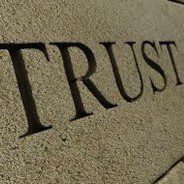
 Arcadia University does not require the GMAT or GRE for admissions into our MBA program.
Arcadia University does not require the GMAT or GRE for admissions into our MBA program. 
